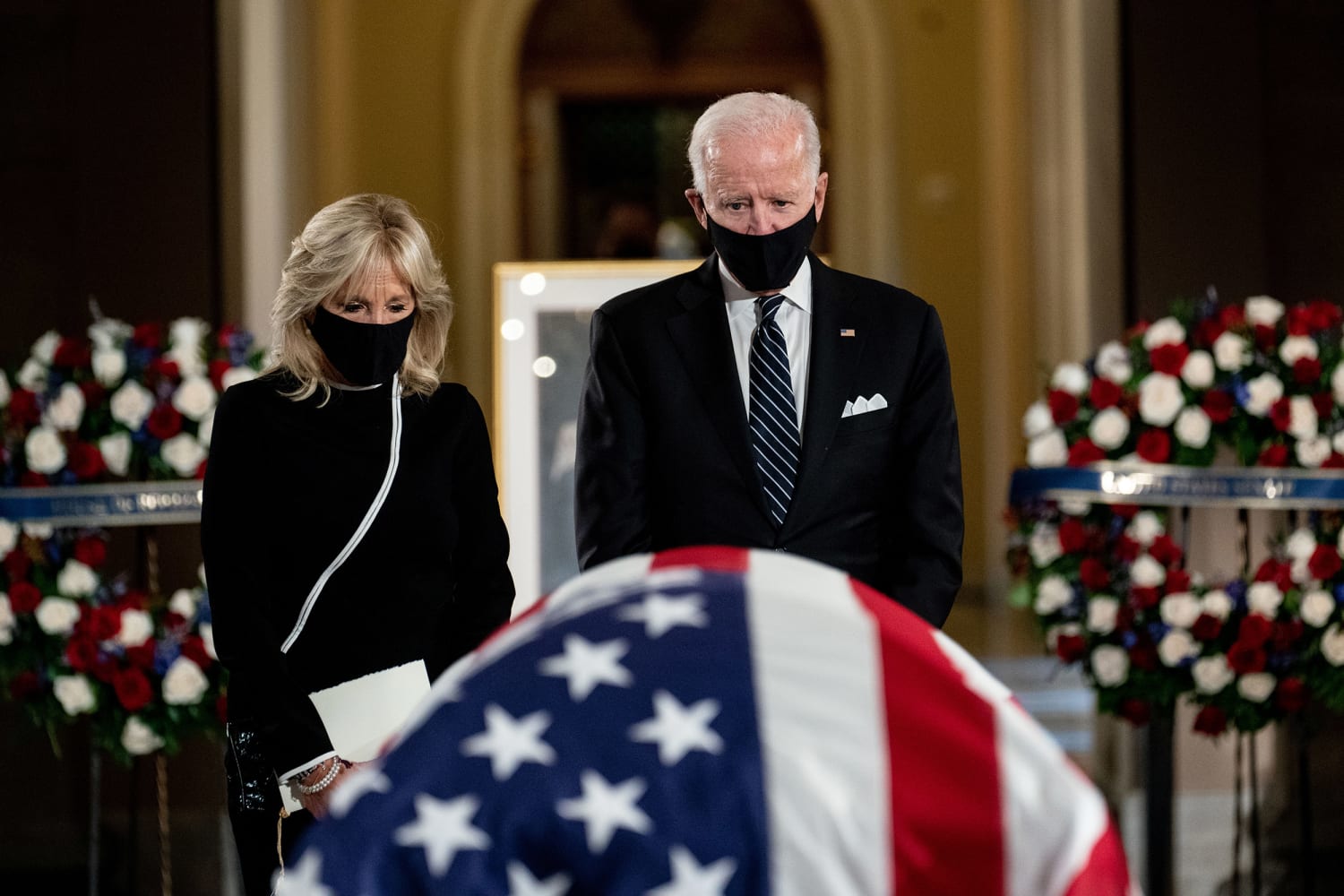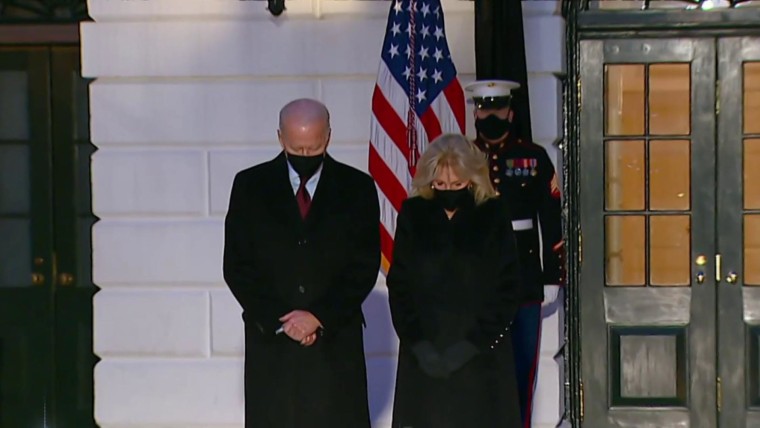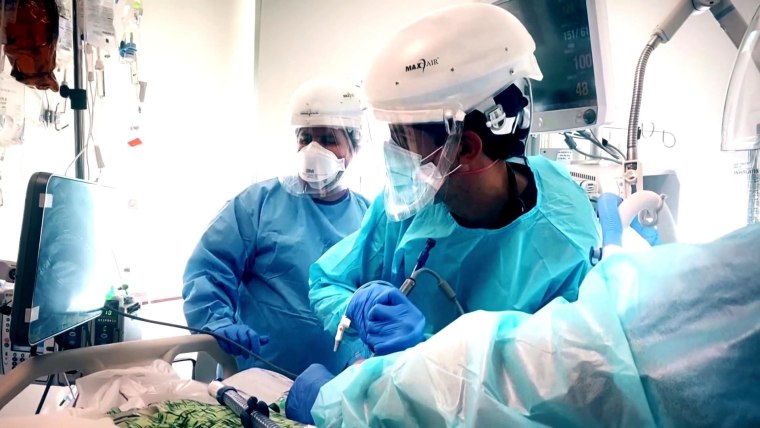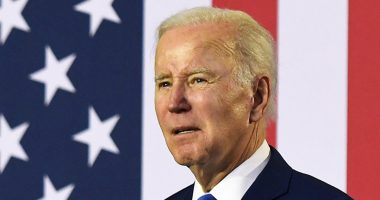WASHINGTON — Joe Biden wanted a vacation. Instead, he got another funeral.
It was May of last year. Biden had recently secured the Democratic presidential nomination, and he wanted to take some time off the virtual campaign trail to coincide with the fifth anniversary of the death of his son Beau.
But then George Floyd was killed, the country exploded into a racial reckoning, and the man who has been dubbed “America’s Grief Counselor,” the “Emissary of Grief” and the “Designated Mourner” felt compelled, once again, to eulogize.
“Unlike most, you must grieve in public,” Biden told Floyd’s family at the funeral. “And it’s a burden. A burden that is now your purpose.”
Public grieving has been Biden’s burden and purpose since he was first sworn into the Senate from a podium erected next to the hospital bed where his sons were convalescing from the car accident that had killed their mother and sister.
And it’s the burden Biden now carries for the nation 100 days into being president of a country that has lost more than 570,000 people to a pandemic while martyrizing people like Floyd.
“Grief must be witnessed,” said David Kessler, a grief expert and author who runs Grief.com and has himself received a condolence call from Biden. “I often talk about how we’re a grief-illiterate society. But we certainly have a leader who knows grief.”
Many of the public rituals of grief were impossible to observe during the pandemic. Families couldn’t gather. Houses of worship were closed. Bodies of loved ones were deemed to be biohazards that had to be disposed of quickly. And Biden’s predecessor showed no interest in performing even the most basic consolations expected of every president.
Kristin Urquiza, who after speaking at the Democratic National Convention about her father’s death from Covid-19 formed a group to work with and advocate for people touched by the virus, said many who lost loved ones felt former President Donald Trump was “gaslighting” them and denying their grief by downplaying the severity of the pandemic.
“It’s been very meaningful for our community to have the president acknowledge that this is happening, this is real, and to do events and take time to recognize this loss,” she said of Biden. “We have all been on this tragic journey for months and months and months where we haven’t been able to collectively grieve.”
Grief has defined Biden’s public life and public image since the story of the young senator’s postcard-perfect family’s being ripped apart made national news shortly after his election in 1972.
And he has become both a student and a master of thanatology, the grim field of study named for the Greek god of death. Biden kept a binder filled with the dozens of eulogies he has delivered, quotations about death he likes or little axioms and anecdotes he had collected along the way.
He weeps in public, speaks often about his personal losses and remembers the death anniversaries of people close to people he knows, and he has been known to appear at a wake or a shiva gathering or a funeral unannounced and without fanfare.
“His empathy is real, it’s authentic — and it’s something he is able to deploy at will like a master craft person,” said Arun Chaudhary, who was the Obama White House videographer.
Chaudhary can still recall verbatim part of the eulogy Biden gave for the 29 coal miners killed in the Upper Big Branch mine in West Virginia in 2010: “They went into the dark so we could go into the light.”
“I filmed thousands of speeches, hundreds of Joe Biden speeches and thousands of Barack Obama speeches, and I can still remember this all these years later,” he said.
Biden wrote a book about grief, “Promise Me, Dad: A Year of Hope, Hardship, and Purpose,” about Beau, the family’s golden child — decorated soldier, attorney general of Delaware, the one who Biden said should be president instead — who died of a brain tumor in 2015.
At Beau’s funeral, the Rev. Leo O’Donovan, the former president of Georgetown University, who was giving the homily, erupted in tears almost immediately after he started.
“He began to comfort me,” O’Donovan revealed to the National Catholic Reporter about Biden. “He became the pastor there.”
Even before the pandemic, when Biden would linger on the rope line at events, sometimes every fourth or fifth person he met would share a story of loss. Some would leave their fleeting encounters with tears in their eyes or feelings of being unburdened, at least for a moment.
At a televised town hall in March 2020, he nearly gave out his cellphone number live on the air to someone grieving before he stopped himself. “Not that I’m an expert, but just having been there, I’m so sorry for you,” he said.
The night before his inauguration, Biden held a Covid-19 memorial service instead of a party and used his first major address from the White House to commemorate the anniversary of the pandemic. He carries in his pocket, on the back of the day’s agenda, the virus’s latest death toll. And his administration has made public funds available to help with funeral costs.
Beyond the pandemic, he has called the families of those killed by law enforcement officers, including Floyd’s, and met with people touched by mass shootings, like the one in the Atlanta area that appeared to target Asian Americans.
“[We] didn’t really talk about hate crime sentencing and all of these things there’s been a lot of discussion around. We really talked about the grief people are feeling,” Georgia state Rep. Marvin Lim told The Associated Press about his meeting with Biden.
Michael Wear, who led faith outreach efforts for Barack Obama’s 2012 re-election campaign, said: “In a previous political era, Biden’s acquaintance with grief could have quite reasonably been identified as a negative. Do the American people really want a man who will cry in public at the thought of his children? For Biden, the culture has sort of caught up with his grief.”
In this moment, empathy is Biden’s “superpower,” his advisers have often said.
“We always heard people talk about Biden, even if they didn’t like that he was a Democrat or didn’t necessarily like all of his policies, one thing that connected them to him is his personality — is that he’s compassionate, is that he’s empathetic,” said Biden’s chief campaign pollster, John Anzalone. “I remember people multiple times saying, ‘He has lived my life.’ And part of that was the tragedies that he had gone through.”
It’s an ability only someone with Biden’s story could have, said Massimo Faggioli, a professor of theology at Villanova University, who wrote a spiritual biography of Biden’s Catholic faith published in January.
It’s not just the loss; it’s his status as a living, breathing example that people can not just endure but “get up, get up, get up,” as Biden often ended his stump speeches, and go on to do great things after great loss.
“He’s not selling talking points. He’s selling his experience, his soul,” Faggioli said. “He has digested tragedy without becoming dark or inward-looking. That is something like a miracle from a human point of view. And it’s also a political miracle, because he became president much, much later than anyone would have expected he possibly could.”
Many presidents have been called upon to act as consoler-in-chief; some of the most memorable moments in the American presidency have come in memoriam.
Abraham Lincoln deliveringd his Gettysburg Address at the commemoration of a cemetery at the battleground. Franklin D. Roosevelt marking “a date which will live in infamy” after the attack on Pearl Harbor, Hawaii. Bill Clinton telling people he could “feel their pain.” George W. Bush speaking with the megaphone on the smoldering ruins of the Twin Towers. Obama singing “Amazing Grace” after a mass shooting at Emanuel African Methodist Episcopal Church in Charleston, South Carolina.
Presidents play a unique role in the American psyche, Faggioli said, as both prime minister of the government and high priest of the so-called American civic religion.
“You can go through tragedies, but despair is not an option if you become commander-in-chief,” he said. “When you accept the job, you understand that you have to deliver on hope, no matter the circumstances.”
Source: | This article originally belongs to Nbcnews.com












